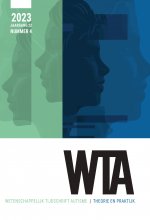
Autisme en Neurobiologie: Wat We (Niet) Weten
Productgroep WTA 2023-4Omschrijving
De vraag die aan de orde wordt gesteld, is welke inzichten het hersenonderzoek tot dusverre heeft opgeleverd voor wat betreft neurale oorzaken van autisme-kenmerken. Op groepsniveau worden zowel anatomische, chemische als functionele verschillen gerapporteerd, zij het vaak gebaseerd op kleine samples. Zo zijn er verschillen in de ontwikkeling en grootte van bepaalde hersengebieden, met (te) veel korte en (te) weinig lange baan verbindingen. Daarnaast is de concentratie van neurotransmitters, zoals GABA en serotonine, (soms) uit balans. Het spiegelneuronen-systeem dat betrokken is bij sociaal gedrag lijkt intact gebleven terwijl andere gebieden betrokken bij de aansturing van deze kwaliteit waarschijnlijk wel zijn aangedaan, waaronder het cerebellum. Verder verschuift de focus van onderzoek van hersenkernen naar hersennetwerken, hetgeen nieuwe onderzoekslijnen en hypotheses genereert, zoals die over het ‘voorspellende brein’.
SUMMARY
After decades of brain research on autism, the question is what insights this research has given into the neural mechanisms underlying autism symptomatology. At the group level, anatomical, chemical and functional differences have been reported, although these are often based on small samples. There are differences in the development and growth of certain brain areas, with stronger local and weaker global connections. Furthermore, the concentration of neurotransmitters such as GABA and serotonin is sometimes disbalanced in autism. Despite what was long thought, there are no clear differences in mirror neuronsystem activation during social tasks, but there are functional differences in other social brain areas, as well as in the cerebellum. Recently, the focus has been shifting to studying large-scale brain networks, a shift that generates new research lines and hypotheses, such as those related to the ‘predictive brain’. Research into autism and the brain is thus still strongly evolving.
